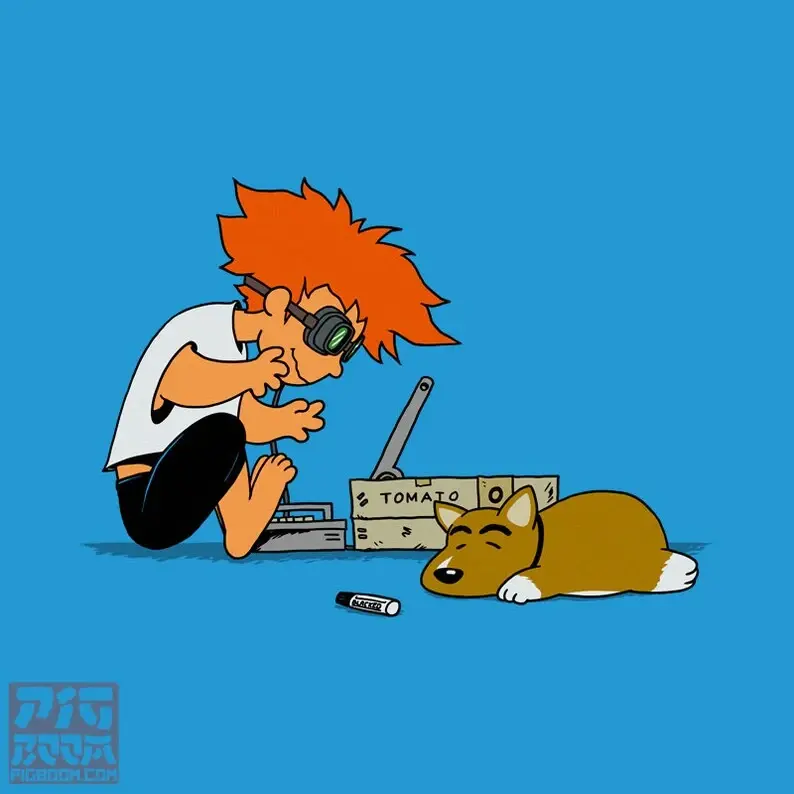For newer GPUs from the Turing, Ampere, Ada Lovelace, or Hopper architectures, NVIDIA recommends switching to the open-source GPU kernel modules.
So 20-series onwards.
And 16xx
Yep! My pre-built 1660 super i got years ago is still chugging along amazingly as a streaming device for my steam deck.
Yes. Everything older is unsupported in terms of the new Linux stuff anymore. Planned obsolescence yk?
deleted by creator
(and probably isn’t allowed to)
I doubt very much it’s about whether they are allowed too or not. They’re the ones at the top of the hardware supply chain, designing their own chips and having them fabricated. It’s them telling other companies, like Gigabyte and EVGA, what they are allowed or not allowed to do.
deleted by creator
My ol’ 1070 doesn’t make the cut hey… ;-;
Maybe it’s just because I’m older and more jaded, but that really feels like the last truly good era for GPUs.
Those 10 series cards had a ton of staying power, and the 480/580 were such damn good value cards.
It’s more that back then was a better time for price to performance value. The 3000 and 4000 series cards were basically linear upgrades in terms of price to performance.
It’s an indicator that there haven’t been major innovations in the GPU space, besides perhaps the addition of the AI and Raytracing stuff, if you want to count those as upgrades.
It feels like the crypto mining goldrush really changed the way GPU manufacturers view the market.
I feel like AI has changed the game. Why sell retail when people are paying you billions to run LLMs in the cloud.
That was mostly because the 20 series was so bad. Expensive, didn’t perform lightyears better to justify the price, raytracing wasn’t used in any games (until recently).
The 30 series was supposed to be more of a return to form, then covid + mining ruined things.
I got a 2060 super and i must say i’m very happy, i do 3d stuff so the ray tracing was plenty useful and despite it getting a bit it fairs pretty great in most games and the price was okay at the time (500 €still a bit high since it was during the bitcoin mining madness =-=")
RTX 3050 (which got a new 6 gb version less than a year ago) is similar to 1070 Ti in terms of performance and 1080s are of course even better. Definitely a ton of staying power, even in 2024.
I bought a secondhand 1080 a couple years ago when the crypto bubble burst finally and it’s still serving my needs just fine. It could play Baldur’s Gate 3 just fine on release last year, which was the last “new” game I played on it. Seems like it’ll still be good for a few years to come so yeah.
Still have a beautifully running 1070. 👌
Comrade. (☞ ͡° ͜ʖ ͡°)☞
I think it works but the performance might not be ideal. Keep on the proprietary module.
I stand with AMD
nvidia transitions fully? that’s all i need to hear, good job nvidia 🏳️⚧️🏳️⚧️🏳️⚧️🏳️⚧️🏳️⚧️
Forgive the stupid question, but what does this mean, exactly? Does it mean Nvidia support on par with that for AMD? Will this enable a release of Bazzite that supports Steam Gaming Mode for Nvidia cards?
It means it will break less on kernel updates. I don’t think it fundamentally changes much else for gaming.
Does it mean Nvidia support on par with that for AMD?
I’m probably not the right person to answer this, but my immediate thought was no. I believe AMD allows for open source drivers on Linux, which this specifically states Nvidia won’t be doing.
No blobs?
Use this bro

Linux using proprietary drivers always feels like a plane using a transmission to me.
Does this mean upcoming distros can have the drivers inbuilt? NVIDIA Cards working out of the box? I’m Out of the Loop.
This has never been an issue. Nothing stops any distro from installing the DKMS drivers at install time. You also have the nouveau driver that can be installed by default if you don’t want to ask users to agree to Nvidia’s license for proprietary driver use.
You also have the nouveau driver that can be installed by default…
And pretty soon, NVK!
NVK is already usable, performancr isn’t 100% of the proprietary driver but I play Overwatch on NVK at 165FPS on my RTX3070 laptop a lot, low settings but very playable. This is with an Optimus configuration (VRR Freesync panel on AMD iGPU) in GNOME Wayland.
oh wow, I have a 3080 TI desktop GPU, I should try it with Overwatch 2 + NVK.
Also: Thanks for OpenRGB. I love it.
Wasn’t nova the new driver?
Never heard of that one. NVK is a brand new open source driver that uses features of the RTX series to reverse engineer Nvidia drivers. According to the project team, those features make it much easier than before, but it limits the scope to RTX series cards and onward.
This is a good discussion: https://old.reddit.com/r/linuxquestions/comments/1cqcnr3/whats_the_difference_between_nvidia_open_source/
Essentially, Nova is a kernel level driver and not user level
But apparently people always had issues with NVidia graphics cards on Linux, no matter what driver it is. And the fact that even Mint and Ubuntu don’t install the drivers by default tells that there indeed are some legal issues with it.
What kind of issues do they have? I’ve used gtx970, 1080, rtx3080 and now 3090 and I’ve never had any issues worth mentioning.
I had all kinds of issues with my 1080 Ti that eventually prompted me to “downgrade” to a 5700XT.
Artefacts, distro updates breaking my system because the graphics driver didn’t like it, stuttering, crashes, flickering, extremely poor Wayland support. It made me hate using my PC to be honest.
By all accounts with the newest driver it’s basically all resolved, and I’m glad to see Nvidia is finally taking steps to open up their graphics stack, so we’re headed in a good direction
…but people really aren’t lying when they’ve been saying Nvidia’s Linux support has been substandard.
Not everyone has the issues. I guess they depend on other hardware, driver version, distro, DE etc
Ubuntu is also stale old software, and shouldn’t be a distro anyone wanting a functional box running new hardware/software should use. Valve realized this and moved SteamOS to Arch so they would have a current stack not constantly 6+ months behind upstream, needing to backport everything to an outdated stack.
Lol, WTF are you talking about? Every bit of this is ignorant. Let me correct you so you’re not running around embarrassing yourself:
- SteamOS was based on Debian. Never had anything to do with Ubuntu. The reason they switched was because it was easier to use an Arch build system to make their own base OS image immutable, but still build native modules to include as well as BSP drivers. Simple.
- Ubuntu is the most widely used base of Linux on the planet, desktop and cloud included.
- Valve writes their own modules for their drivers. This is the dumbest thing you’ve asserted so far in that Ubuntu somehow is responsible for drivers. Because you seem to know nothing about Linux in general, I’ll just let you know the kernel handles the detection and loading of modules and drivers. Any distro on 6.8 has the same ability to detect and load drivers for any other distro running 6.8. I have no idea why you thought this had something to do with packaging in distros lolz.
- Do you know what a backport is? It seems you do not.
Anyway, your entire understanding of how everything works is wrong. You should read more.
way to be a dick
It was warranted.
Eh.
Seems I hit a nerve, sorry.
Lol, WTF are you talking about? Every bit of this is ignorant. Let me correct you so you’re not running around embarrassing yourself:
- SteamOS was based on Debian. Never had anything to do with Ubuntu. The reason they switched was because it was easier to use an Arch build system to make their own base OS image immutable, but still build native modules to include as well as BSP drivers. Simple.
Yes, sorry I got SteamOS and Steam for Linux conflated. While SteamOS has moved from Debian, the Steam for Linux github still lists “Latest Ubuntu or Ubuntu LTS with a 64-bit (x86_64, AMD64) Linux kernel”. As for the move for SteamOS to Arch, taken from Alberto Garcia who made the pitch and was on the team doing the work described it as such.
SteamOS 3 "is a customization layer on top of Arch Linux; almost all of the packages come directly from Arch, without being changed or even rebuilt. The Arch Linux philosophy is for packages to be as close to upstream as possible; downstream patches are not applied “unless it is really necessary”. SteamOS has adopted the same philosophy; when there is a problem with a package, it is fixed upstream whenever possible.
And you are correct in that they then use the Arch image to make an immutable A/B partitioning scheme for SteamOS. But you must also agree that Arch gets them using upstream packages instead of stale outdated ones if left on Debian, and is the reasoning behind the change.
- Ubuntu is the most widely used base of Linux on the planet, desktop and cloud included.
It may well be, but I think it is a disservice to new people for anyone to push them towards a distro that will be running outdated software from day 1 of their install (especially since these people are “gamers”). Oh but you just need to add a PPA! Super, add in the many someone wanting to run any semblance of an updated system might want and guess what, update time and Ubuntu just fell over. OK, maybe they somehow manage to preemptively disable all the PPA repos they have added before upgrading, yay!, I would say it’s still a 50/50 on if Ubuntu shits the bed on upgrade anyway. (I ran Ubuntu for many years before I learned my lesson)
- Valve writes their own modules for their drivers. This is the dumbest thing you’ve asserted so far in that Ubuntu somehow is responsible for drivers. Because you seem to know nothing about Linux in general, I’ll just let you know the kernel handles the detection and loading of modules and drivers. Any distro on 6.8 has the same ability to detect and load drivers for any other distro running 6.8. I have no idea why you thought this had something to do with packaging in distros lolz.
When did I assert anything you are alleging?? And I understand how loading modules works, thanks. I also know that when update your system base more then every 6+ months, that sometimes system libraries change, and sometimes modules need to be recompiled against them. Also using kernel 6.8 is a great example of how running an outdated distro IMHO would put a “gamer” at a disadvantage, when 6.10 was just released. And with these kernel updates come new modules for newer hardware, as well as fixes for filesystems, etc. (all things that would be helpful if you want to game on your PC and not just “work”)
- Do you know what a backport is? It seems you do not.
What did I mention that was incorrect about backports? They happen all the time for distros that need to maintain an LTS for years, allowing them to fix bugs without needing to move everything forward. Do I have it correct now?
Anyway, your entire understanding of how everything works is wrong. You should read more.
I appreciate your talking down to me, you are truly the Linux ambassador we have been awaiting! All hail @just_another_person@lemmy.world! All hail @just_another_person@lemmy.world! May his reign be long and prosperous! Everyone else RTFM!
So, it’s just the philosophy of FOSS stopping distros from using proprietary?
I’m not sure what distro you’ve used that was unable to install Nvidia drivers as part of the general OS install process, but it would have been due to needing the user to agree to the proprietary driver’s EULA.
I’m using Mint. It doesn’t install proprietary Nvidia drivers along the system install. But provides a slick Driver manager where you download proprietary Drivers without any hassle. It does include nouveau during install though.
Yes, this is what I’m explaining. They can’t LEGALLY just install it for you without you agreeing to the license, so there needs to be a prompt for that before doing so.
But, what about some Distros have NVIDIA Versions, Which come with proprietary Drivers? Like Nobara, Bazzite, Pop OS…?
They don’t have legal issues?
I think its because the country they are based on. I also heard that VLC has lots of codecs (even proprietary ones), because it’s origin country doesn’t restrict them to use proprietary codecs.
I’m not aware of any distros catering to specific locales in their installers, but maybe that’s a thing.
Well, what I really wonder is if because the kernel can include it, if this will make an install more agnostic. Like literally pull my disk out of a gaming nvidia machine, and plug it into my AMD machine with full working graphics. If so this is good for me since I use a usb-c nvme ssd for my os to boot from on my work and home machines and laptops for when I’m not worrying. All three currently have nvidia cards and this works ok. I have some games to chill and take a break. My works core OS for work MDM etc unmodified. I like it that way.
I realise this is not a terribly useful case, but I could see it for graphically optimised VM migrations too not that I have many. Less work in transitioning gives greater flexibility.
Like literally pull my disk out of a gaming nvidia machine, and plug it into my AMD machine with full working graphics.
This should work already, i switched from nvidia to amd this year by swapping the cards and removing the nvidia drivers some time later.
I guess it’s because the drivers only apply to their specific hardware, so no problems having amd and nvidia drivers present at the same time.
The kernel drivers were never an issue, but userspace drivers fixed this many years ago with glvnd.
Pop OS exists my dude.
I don’t understand, If Pop OS, Nobara, Bazzite can, why not all distros? Is it a philosophical reason to not include proprietary drivers?
In the case of Debian I think it is philosophical. It’s been years since I’ve had to install proprietary things on Debian, but they used to be all in the non-free repository that you had to add manually. Honestly I like it, it reminds me I’m putting proprietary crap in the machine. Can be a pain in the ass when the wifi doesn’t work because some proprietary firmware is missing, and the laptop doesn’t have an Ethernet port so off you go to buy a usb-eth adaptor.
it reminds me I’m putting proprietary crap in the machine.
Agreed.
Can be a pain in the ass when the wifi doesn’t work because some proprietary firmware is missing, and the laptop doesn’t have an Ethernet port so off you go to buy a usb-eth adaptor.
happened to me too. Lame mediatek doesn’t have drivers for Linux.
, and the laptop doesn’t have an Ethernet port so off you go to buy a usb-eth adaptor.
What, no Android USB tether? It’s been native since Debian 6 IIRC.
I had an iPhone (4, don’t remember if it had usb tethering) but I didn’t even think of it. I think it was Debian 6 the one I was installing and there was one or two people with android phones…but whatever! Walking is healthy, isn’t it?
Fedora does not because they can’t support it. If a bug is found all they can do is shrug and point you at Nvidia. If they want to add a feature that breaks they would be stuck and have to hold back other drivers.
Nvidia, fix power management on open drivers. Then we are talking.


















